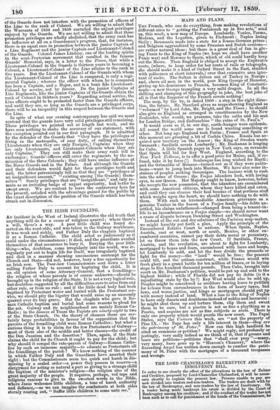THE IRISH FOUNDLING.
Ix incident in the West of Ireland illustrates the old truth that anything will do for a cause of religious quarrel; where there's a will, there's a way. A poor little child was found de- serted on the road-side, and was taken to the Galway workhouse. It was weak and sickly, and Father Daly the chaplain baptized it as a Roman Catholic. The child acted as judiciously as it could under the circumstances • it died, and the guardians availed themselves of that occurence to bury it. Burying the poor little thin—who, doubtless, came irregularly into the world, was ir- regularly put out to begin life for itself, was irregularly baptized and died in a manner showing unconscious contempt for the Church and State—did not, however, bury a fine opportunity for an Irish row. The Poor-law Commissioners sent down a letter calling Father Daly to account for baptizing the child. It is an old opinion of some Attorney-General, that a foundling— the religion of whose parents is of course unknown—should be brought up in the religion of the State. It is not a very logical rule, but doubtless suggested by all the difficulties sure to arise from any other rule' or from no rule ; and if the little dead body had been baptised by Protestant water and buried with the Protestant ser- vice, we should pity the bigotry that would raise up an unseemly quarrel over its tiny grave. But the chaplain who gave it Ro- man Catholic baptism and burial had some reasons to plead for the act. Galway and, its neighbourhood are mainly Roman Ca- tholic; in the diocese of Tuam the Papists are ninety-eight to two of the State Church. On the theory of chances there are cer- tainly large probabilities in favour of the supposition that the parents of the foundling child were Roman Catholics; but what a curious thing it is to claim for the few Protestants of Galway— most of them also of the middle and better classes—the credit of the Don Juanism and the desertion? Then, again, if the State claims the child for its Church it ought to pay for the child; but why should it compel the rate-payers of Galway—Roman Catho- lics by such an immense majority—to educate as Protestants all the foundlings of the parish We know nothing of the manner in which Father Daly and the Guardians have asserted their right; but the Commissioners seem too quick and harsh in dis- missing by a sealed order—a power they possess in reserve—a clergyman for acting so natural a part as giving to a strange child the baptism of the minister's religion—the religion also of the great majority of the people. It requires, perhaps, red tape and religious rancour to give to the sweetest words in the Bible where Jesus welcomes little children a tone of harsh anthorit; and defiance,—as we can imagine the combatants at both sides sternly roaring out, "Suffer little children to come unto me."


































 Previous page
Previous page